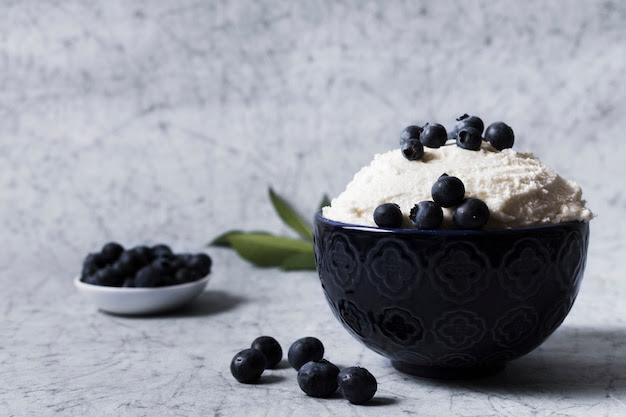
Yogurt has a long history. It was accidentally discovered around 4’000 years ago when nomadic tribes roamed the land. The nomads carried their milk in animal skins, creating a ripe environment for bacteria to grow and cause fermentation, producing yogurt. In all probability, yogurt was discovered in this way in different places at different times and probably originated in the Middle East and Central Asia.It seems, nowadays, people are rediscovering yogurt, and this is one of the new superfoods at least in certain parts of the World. According to Statista:Revenue in the Yogurt segment amounts to US$ 90.61 billion in 2022. The market is expected to grow annually by 8.86% (CAGR 2022-2027).The average volume per person in the Yogurt segment is expected to amount to 7.8 kg in 2022.
In the Yogurt segment, volume is expected to amount to 44’391.5 million kg by 2027. The Yogurt segment is expected to show a volume growth of 6.0% in 2023.
Yogurt was part of people’s diet for centuries, especially in the Balkan lands and Bulgaria played a vital role in introducing yogurt to the West and turning it into the popular, commercial product we know today. The promotion of Bulgarian yogurt in other European countries began after the recovery of the French King Francis 1 (1515 – 1547) who had suffered a stomach disease.

A Jewish doctor was called from Constantinople, who came to Paris with a flock of about 40 sheep. He was fermenting the sheep milk and the produced yogurt was served as food that cured the King. The King was fully healed quickly, and this was the first noticeable evidence of the healing properties of the Bulgarian yogurt.
It was a Bulgarian scientist who first broke down the composition of yogurt at the beginning of the 20th century. the Bulgarian doctor, Mr. Stamen Grigorov, a student of medicine at Geneva University, undertook research on Bulgarian yogurt and found that the cause of fermentation is due to one rod line and one spherical bacteria. The microorganism became known as “lactobacillus bulgaricus” forever linking the Bulgarian nation to yogurt production. Notice of his discovery was published in “Revue Medicale De La Suisse Romande” issue 10 dated 20.10.1905, Genève.
At the same time, the winner of the Nobel Prize, Ilya Mechnikov (1845-1916), working at Pasteur Institute – Paris, began research on the causes of human aging. He found that during feeding the protein substances in food are degraded by the action of putrefactive intestine bacteria that cause poisoning of the body and early death. He proves that the only food that could restrict the development of putrefactive bacteria in the intestines is Bulgarian yogurt, which is explained by the largest number of healthy centenarians in Bulgaria.

The qualities of Bulgarian yogurt – this ancient product, created over the centuries by our ancestors are still to be revealed. However, several beneficial effects of Bulgarian yogurt on the human body have been proven a long time ago and have remained uncontested:
Yogurt consumption delays an organism’s aging.
Lactic acid bacteria in yogurt help improve immunity.
Lactic acid bacteria prevent cancerogenic substances synthesis and limit mutations and formation of cancer cells.
Yogurt helps prevention of cardiac diseases.
Yogurt has a probiotic effect and influences extremely beneficially the stomach and intestines.
Yogurt is neutralizing toxic substances obtained from the processes of kidney and liver detoxication.
Yogurt and dairy products are the best sources of easy assimilation Calcium is vitally important for bones and teeth building.And last but not least – dairy products are extremely tasty and are an indispensable part of the national cuisine for centuries.
However, with all its proven benefits why do so many consumers around the World hate Bulgarian yogurt? Most probably it is due to its specific taste – some consumers took its sourness to mean that the product had gone and doubted its edibility. In fact, in the Bulgarian language, “yogurt” refers to anything foreign or not prepared in the traditional manner, while Bulgarian yogurt is called “sour milk” (kilo make).
But consumer attitudes are changing, and consumer trends are shifting toward health and wellness. As an example, 35 years ago, the Japanese often considered yogurt a substance distasteful or even inedible and now, it is just a daily necessity and a symbol of health and well-being for them. Even, in one 2015 article, Japanese consumers claimed that Meiji’s Bulgarian yogurt was more popular than Coca-Cola’s.

Most probably, you have heard of or even tested Greek Yogurt – what is its difference from Bulgarian yogurt?
Both, Bulgarian and Greek yogurt starter cultures contain the same two strains of bacteria – lactobacillus bulgaricus and streptococcus thermophilus. However, there is a difference between the ratio of the two in each one of the types of yogurts resulting in two completely different yogurts.
Greek Yogurt is a thick yogurt with creamier consistency and has a milder taste than Bulgarian yogurt. Greek yogurt is also usually strained multiple times to make it thicker and creamier which ends up leaving you with a little bit more sugar and a little bit more depth and consistency than the actual yogurt. It also ends up giving a little bit of higher protein content.
Bulgarian Yogurt is thick and creamy in nature and has an impeccable taste with just the perfect balance between being mild and tart. It is unlike any other yogurt you have ever tried. It is a little bit different in the fact that it is not strained so it is left with all the goodness that is normally going to come from yogurt.

Not going through a straining process, means you are left with a little bit more whey, which in theory would make you think that there would be more milk sugar in it but since there are more bacteria strains in Bulgarian yogurt, they feed off of the sugar and end up killing off the sugar, so you ultimately end up with a much better yogurt having more in the way of probiotic strains. Moreover, Bulgarian yogurt has a significantly lower carb content per serving compared to Greek yogurt.
Anyway, no one is essentially better than the other. Greek yogurt is going to be better if you want a little bit more protein, but Bulgarian yogurt is going to be a bit better if you are looking for the diverse probiotic effect since there is about 90 billion CFU in a serving of Bulgarian yogurt versus about 25 – 30 billion CFU for the Greek yogurt. Still a lot of bacteria but one is almost three times as much as the other.

And at the end, with the forthcoming summer, a simple receipt for a drink which will refresh you and support your immune system, and most probably it will help you to adopt Bulgarian yogurt to your daily diet – the Bulgarian ayran:
Ingredients: 4 cups of Bulgarian yogurt, 2 cups of water, and a pinch of salt.Preparation: pour yogurt into a bowl and beat until smooth, add water and continue beating until thoroughly blended, or combine in an electric blender and blend until smooth.
If you want to add some twist to it, you can try it with some finely chopped mint leaves mixed into the ayran. If you prefer the ayran to be more liquid, you could increase the quantity of water. If you want a lot of foams on top of your ayran, you can substitute sparkling water for water in the recipe. There will be no difference in taste.
https://en.wikipedia.org/wiki/Yogurt


